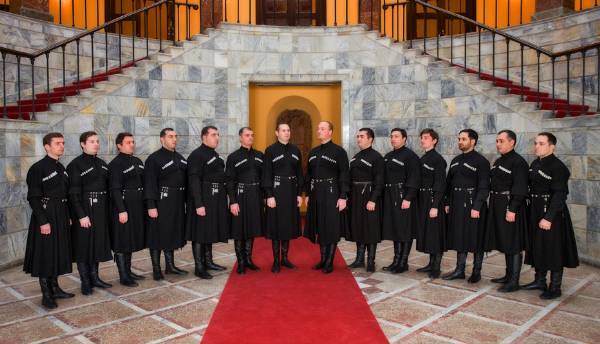
The Democratic Republic of Georgia, a small country nestled in the North Caucasus between Russia and Turkey, often goes unnoticed in the United States, except when it’s confused with the southern state sharing its name. The country of Georgia, however, has a rich musical tradition of which the crowning jewel is men’s three-part singing. For those looking to venture into music unlike any they have experienced before, look no further than the Ensemble Basiani concert this Tuesday at 7:30 p.m. For one night only, the internationally acclaimed 12-member, all-male vocal ensemble under the direction of Giorgi Donadze will take the stage at Krannert Center’s Foellinger Great Hall and will perform a wide variety of repertoire from their home country.
What makes the type of music that Ensemble Basiani performs stand apart from the music that Americans usually experience? Matt Knight, a University of Illinois Ph.D. student in ethnomusicology, studies Georgian men’s singing, and in fact just recently returned from a short visit to the Republic of Georgia. He offered a few of his thoughts on the matter.
“There’s something about Georgian men’s singing that just has a completely new kind of energy and dynamic. It has its own visceral energy,” he said, explaining what drew him to this particular area of study. “The main thing for me is the striking harmonies and the powerful tone quality.”
These “striking harmonies” come as a result of Georgia’s highly developed polyphony, a system of multi-voice singing that is well over 1,000 years old. While Western art music also uses polyphony, for instance in old church chants and much Baroque music, the polyphony that Ensemble Basiani performs, particularly the polyphony from western Georgia, sounds completely different. As heard in the video below, when the independent voice lines of western Georgian men’s polyphony weave together, they end up producing dissonant chords containing intervals of seconds, fourths, sevenths, and ninths before ultimately resolving in “stable” intervals of unisons or fifths. To an audience used to music favoring thirds and sixths, as Western music largely does, the difference is immediately noticeable and can even seem a bit jarring.
“Some would say that people with good musical ears tend to like this music because the harmonies are so different and seem so modern,” Knight joked.
In addition to the unusual harmonies, certain vocal techniques also contribute to the uniqueness of Georgian singing, most famously the krimanchuli, literally translating to “distorted falsetto,” or “distorted jaw.” This yodeling technique, demonstrated in the video below, will most definitely be featured in Tuesday night’s concert. Krimanchuli commonly appears in the solo upper voice and almost gives the impression of a bagpipe in its intensity.
While Ensemble Basiani performs all vocal music, certain instruments also feature in their performances on some songs. They use both the panduri and chonguri, strummed string instruments somewhat similar to the mandolin, to accompany urban-style songs in particular, and sometimes even include the chiboni, a goatskin bagpipe from the Georgian highlands. Both the panduri and the chiboni feature in the last three minutes of the following video.
Beyond the uniqueness of the musical style and the instruments used, Ensemble Basiani’s costumes featuring long black coats, black boots, and swords also add distinctiveness to their performance. Knight explained:
It’s now essentially a dress costume, but at one point, [the Ensemble Basiani costume] would have been something that a highland warrior would have worn. It’s a style also common to other groups in other regions of the North Caucasus. They have their swords, and on their upper chest they have silver capsules that would have been used for holding bullet powder along with the militaristic, long robe. There’s this idea of the strong, masculine, fighting man that is very much a part of how Georgians view their past and is a part of national pride today. This is also observed in the singing style and musical style that you hear.
Knight further elaborated on the portrayal of such ideas of masculinity in Georgian men’s singing:
It definitely reflects that Georgia and the Caucuses are a fairly patriarchal society, and gender roles are very strictly defined in that part of the world. There are all-women’s performing ensembles, too, but the style is more restrained and gentle; the voices tend to move together a bit more. The music tends to be more ‘flashy’ in the men’s ensembles…You get more displays of solo virtuosity.
These differences also carry over into the types of dance associated with the contrasting genres.
“[Gender distinctions] are reflected in the dance styles that you might see in the performance, too. Women’s dancing tends to be subdued, elegant, and graceful, while the men’s is more aggressive and militaristic. It’s about the man displaying his prowess,” Knight elaborated.
In general, according to Knight, Georgians place a high value on their men’s polyphonic style, regarding it as a point of national pride and as something that sets them apart from their neighboring countries. While Georgians themselves hold Ensemble Basiani in high regard, the pride they take in this type of music goes even deeper. Many Georgians take part in this musical tradition as amateurs and know the songs that Ensemble Basiani performs.
“Often people know multiple parts to these songs. It’s not uncommon for people on the street to hear someone else singing a song and just join in,” Knight said of his recent stay in Georgia.
While participatory singing likely will not be a part of Tuesday’s concert, Ensemble Basiani’s performance promises to be a rich musical experience for anyone who attends. Be sure to mark your calendars so you can hear this unique, virtuosic, and powerful music in concert for yourself.
Ensemble Basiani will take the stage at Krannert Center for the Performing Arts tonight at 7:30 p.m. Get your tickets here.








